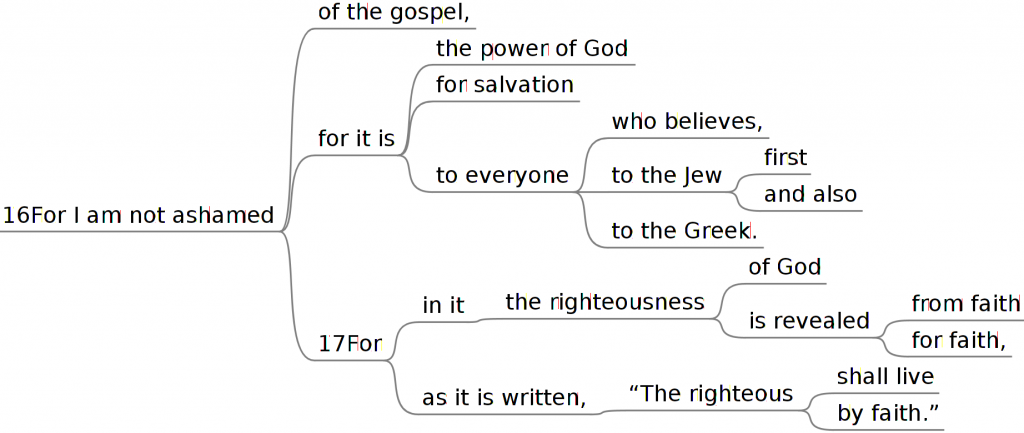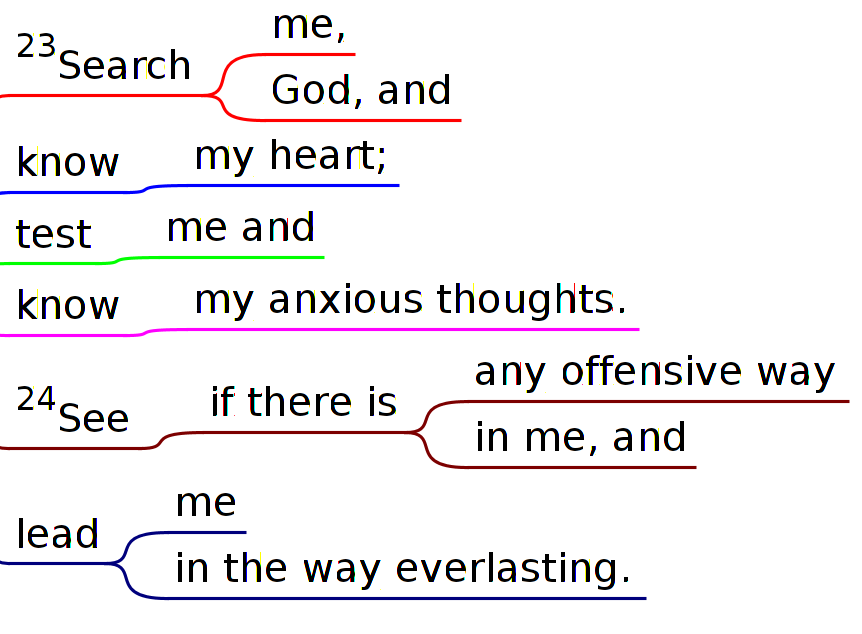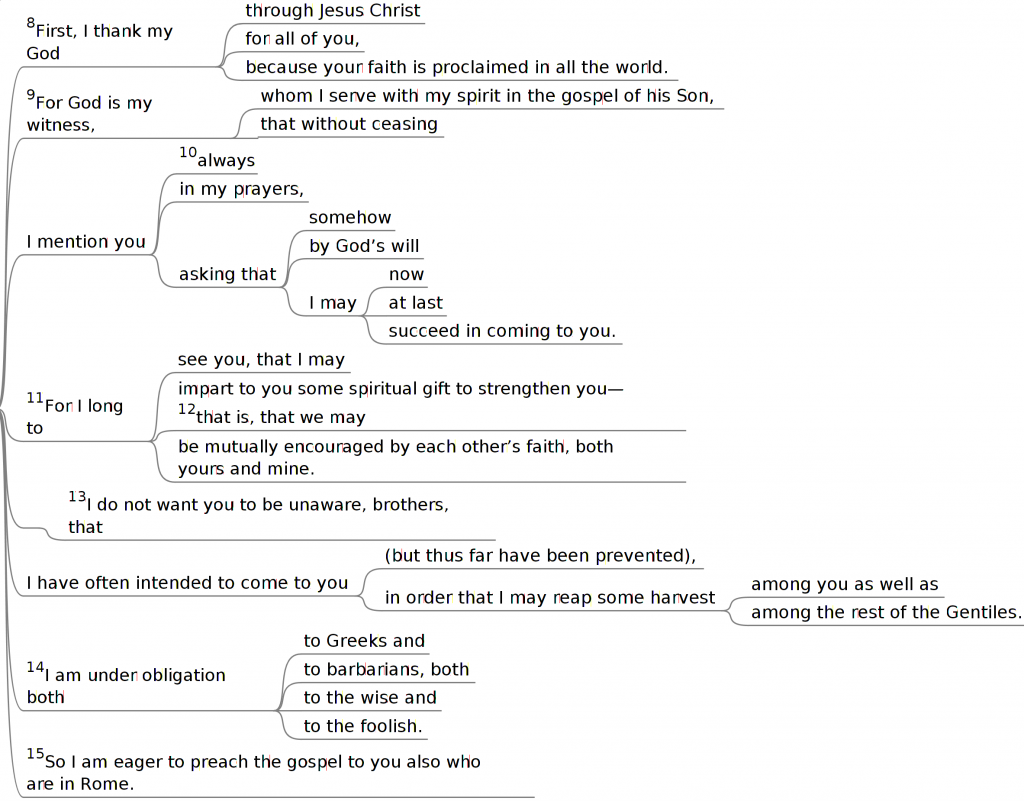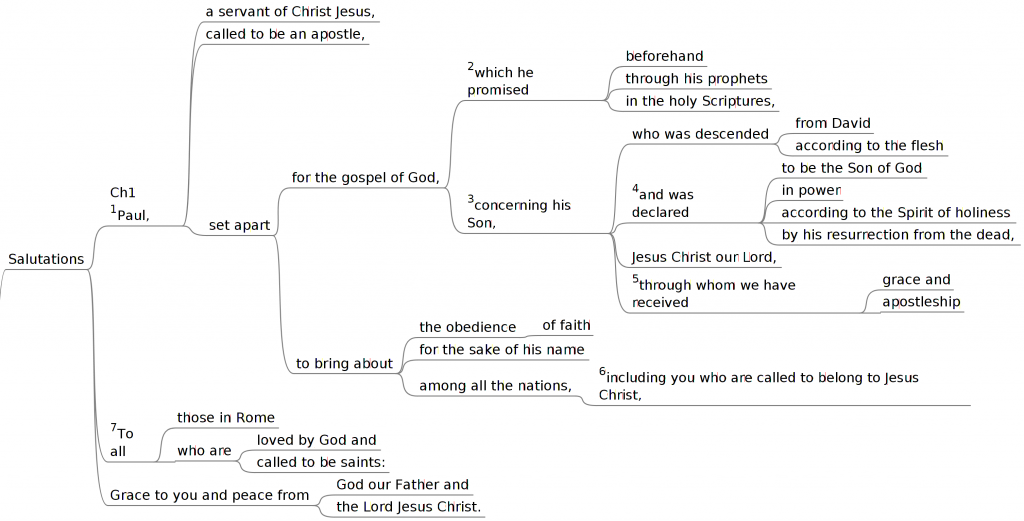This passage contains what is almost unanimously agreed to be the thesis of the book of Romans. It has a couple ambiguities, perhaps because multiple readings each contain aspects which will be brought out in more detail later.
First, I’m not sure about the three for‘s in this passage. The first is clear enough, and the second connects the next part to it, but it is unclear if the third for connects the third section back to the first, or to the second. That is, when he says
16For I am not ashamed of the gospel, for it is the power of God for salvation to everyone who believes, to the Jew first and also to the Greek. 17For in it the righteousness of God is revealed from faith for faith, as it is written, “The righteous shall live by faith.”
It is clear that he is not ashamed because the Gospel is God’s power, etc. but does the righteousness of God revealed by faith in it further ground his not being ashamed? This would make sense, as parallel grounds to the one statement, but it would also make sense to see the three for‘s as nested. In the nested reading, the righteousness of God … revealed by faith is the grounds for the gospel providing salvation to everyone who believes. In other words, the gospel is not just for Jews, but for everyone, and for a very specific reason. This has nothing to say against Abraham, but he isn’t the ground for this power of God. This power of God is based on faith, and that is why it is available regardless of ethnic identity.
Both readings make sense, so maybe Paul meant this to be ambiguous, to include them both. But I think the second (nested) interpretation fits better with where he is going with regards to faith and Abraham/Moses, etc. I’ll have to think through this some more.
Second, as I talked through this passage with other teachers, it came out that some differed on the reading of the quote from Habbakuk: “The righteous shall live by faith (or, The one who by faith is righteous shall live)“. This footnote in the ESV (in parentheses) contains a second reading; other translations pick one or the other, e.g., the NIV “The righteous will live by faith” and the NET “The righteous by faith will live”.
The question seems to surround whether Paul is talking about those that are righteous by faith, who live, or whether he is talking about how the righteous live, i.e., by faith. In the first, Paul would be talking about justification (i.e., that people are legally righteous by faith, not some other means), while in the second sanctification would be in view (i.e., that people who are righteous live by faith (not by some other means).
But again, I think this might be an intentional ambiguity. Given where Paul will ultimately go in Rom 8:28-30, I don’t think he has a strong distinction between those who are justified and those who are sanctified. They are one group of people, even if we can talk about two distinct things happening to them. So to say that the righteous live by faith is true, but they are also only by faith that they are righteous at all. On the other hand, it is true that any true righteous is obtained by faith, but the fruit (and expectation, or reward) of that righteous standing is life. Once God has justified you, you get to really live, not afraid of the wrath that would otherwise be due to you. But you are also expected to live, as a natural outpouring of what God has done for you. That is, a holy life is possible on the grounds of the right standing (justification) God has given you in Jesus. But Paul will get there eventually. In any case, I think it likely that when Paul talks about salvation in v16, he has the whole package in mind. This power of God calls people out of the kingdom of darkness, into the kingdom of light. It gives people a right standing with God, and it also provides the strength and motivation for right living. And it will ultimately bring us into the eternal presence of God, free from the power and presence of sin, forevermore.
One last point I thought interesting in this passage, is the reference to Barbarians. Typically, Paul talks in terms of Jews and non-Jews (Gentiles), as in v16. But in v14, he refers to barbarians, those beyond even the ancient boundaries of Alexander the Great’s Empire (which spread the Greek language and culture. So this is not just a Jew/Gentile thing, the fact that faith is the ground of our salvation. It is also a culture/uncultured thing, and a civilized/uncivilized thing. There is no distinction that the ground of faith does not reach across. This is the word of God that is easy, in our mouth. But we’ll get there in Ch 10.
Our church is taking a week off of Romans next week (not sure why), so we’ll pick up on v18 next week.




